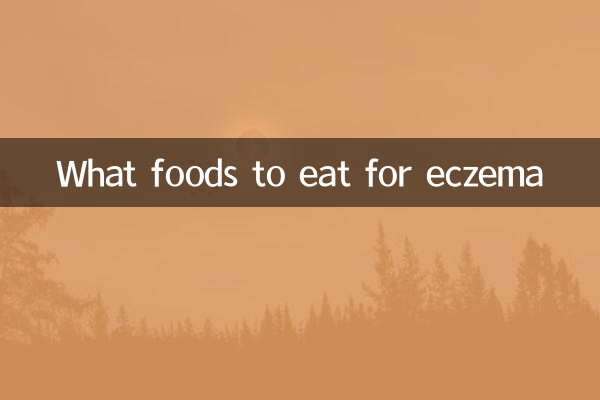What foods to eat for eczema: Dietary guidelines for alleviating symptoms
Eczema is a common skin inflammation that manifests as redness, itching, dryness and even desquamation of the skin. In addition to drug treatment, dietary conditioning is also an important way to relieve eczema symptoms. This article will combine popular topics and hot content in the past 10 days to introduce you in detail the foods suitable for eczema when you develop eczema, and attach structured data to help you deal with eczema scientifically.
1. The relationship between eczema and diet

The pathogenesis of eczema is complex and may be related to genetics, immune system abnormalities, environmental factors and diet. Certain foods may aggravate or relieve symptoms of eczema. Research shows that foods rich in antioxidants, Omega-3 fatty acids and anti-inflammatory ingredients can help reduce inflammation and improve skin health.
2. Food recommended for eczema patients
Here are the foods that eczema patients can choose first, which are not only nutritious but also help relieve symptoms:
| Food Categories | Recommended food | effect |
|---|---|---|
| Foods rich in Omega-3 fatty acids | Salmon, flax seeds, walnuts | Relieve inflammation and improve skin barrier function |
| Foods rich in antioxidants | Blueberries, spinach, carrots | Reduce free radical damage and relieve skin inflammation |
| Probiotic food | Yogurt, pickles, miso | Regulate intestinal flora and enhance immunity |
| Hypoallergenic foods | Brown rice, pumpkin, apple | Reduce allergic reactions and avoid worsening symptoms |
3. Foods that eczema patients should avoid
Certain foods may induce or aggravate the symptoms of eczema. Patients with eczema should try to avoid or reduce intake:
| Food Categories | Food should be avoided | reason |
|---|---|---|
| High histamine food | Cheese, bacon, alcohol | May cause allergic reactions and aggravate itching |
| High-sugar foods | Cakes, candies, carbonated drinks | Increases inflammatory response and damages skin health |
| Spicy and irritating food | Chili peppers, peppers, mustard | Irritating the skin, aggravating itching and swelling |
| Common allergens | Milk, eggs, peanuts | May induce or aggravate eczema symptoms |
4. Other precautions for eczema diet
1.Individual Differences: The food sensitivity of eczema patients varies from person to person. It is recommended to record your reactions through a diet diary and find a diet plan that suits you.
2.Balanced nutrition: Avoid excessive dietary restrictions and cause malnutrition, and ensure adequate intake of protein, vitamins and minerals.
3.How to cook: Gentle cooking methods such as steaming, boiling, and stewing are preferred, and avoid high-calorie and high-fat cooking methods such as frying and barbecue.
4.Replenish hydration: Drink enough water every day to keep your skin moist and reduce dryness and itching.
5. Recent hot topics and eczema diet
In the past 10 days, hot topics about eczema diet have focused on the following aspects:
1.Probiotics and eczema: Research has found that supplementing probiotics may improve eczema symptoms by regulating intestinal flora, especially in children with eczema.
2.The effects of vitamin D: Vitamin D deficiency may be related to the onset of eczema. Proper supplementation of vitamin D or increasing sun exposure can help relieve symptoms.
3.The rise of an anti-inflammatory diet: Anti-inflammatory diets (such as the Mediterranean diet) have become a popular choice for eczema patients because of their rich in antioxidants and healthy fats.
Summarize
Dietary conditioning for eczema is a long-term process, and patients need to adjust their dietary structure according to their own situation. By choosing anti-inflammatory and hypoallergenic foods, avoiding foods that may aggravate symptoms, and combining drug treatment and skin care, it can effectively relieve eczema symptoms and improve quality of life. If you have questions about dietary adjustments, it is recommended to consult a professional doctor or nutritionist to develop a personalized diet plan.